SIGN UP FOR NEWSLETTER
Be the First to Know. Sign up to newsletter today
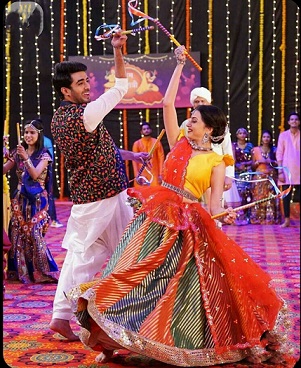
Jyoti
285 views
add comment
A Celebration of Color, Culture, and Tradition
Durga Puja and Navaratri are not just festivals—they are vibrant expressions of faith, community, and Indian heritage. Every autumn, as the air turns crisp, people gather to honor the goddess Durga and celebrate the triumph of good over evil. Central to these festivities are the stunning ethnic for women, men, and children, which paint the occasion in a riot of colors and sparkling tradition. Choosing the perfect attire for Durga Puja and Navaratri is an act of devotion, a nod to ancestral customs, and a joyful embrace of regional and contemporary styles.
Durga Puja and Navaratri are marked by religious rituals, music, dance, and cultural programs. Particularly for many, the highlight is the opportunity to dress in their finest ethnic wear, often new, as a symbol of renewal and respect for the goddess. In Bengal, where Durga Puja is the grandest celebration of the year, sarees in red and white dominate the scene. Navratri celebrations in Gujarat and Maharashtra,brings forth the dazzling spectacle of Garba and Dandiya nights, with swirling lehengas and chaniya cholis. In South India all the 9 nights are celebrated as Navratri with beautiful display of dolls.The 10th day is celebrated as Dussehra in North India ,by burning an effigy of Ravan, the demon .
More importantly,the act of dressing up is, therefore, more than aesthetic. It is certainly a way of connecting with one’s roots and participating fully in the collective spirit of the festival.
In this blog, we explore the best festive Indian outfits for Navratri, Durga Puja and Dussehra to help you this season.
For instance, no attire captures the essence of Indian tradition like the saree. For Durga Puja, the classic Bengali saree—especially the laal paar (white saree with vibrant red border)—is iconic. Women drape it in the Bengali style, pairing it with traditional gold jewelry, red bindis, and fresh flowers in their hair. Silk sarees, such as the regal Banarasi, Kanjeevaram, and Tussar, are also popular, with their intricate zari work and jewel-toned hues adding a touch of grandeur to the celebrations.
During Navaratri, the saree becomes an equally favored choice, often worn for poojas and festive gatherings. Bright, contrasting colors, resplendent embroidery, mirror work, and lightweight fabrics like chiffon and georgette create a festive look that is both comfortable and elegant.
India’s vast cultural landscape is reflected in the diversity of ethnic wear seen during Durga Puja and Navaratri. Here are a few regional highlights:
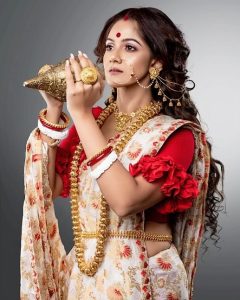
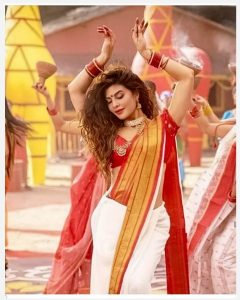
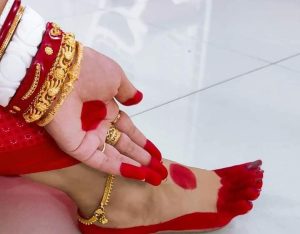
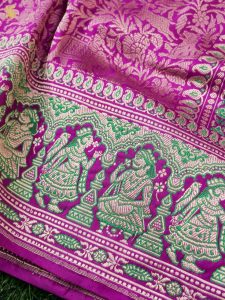
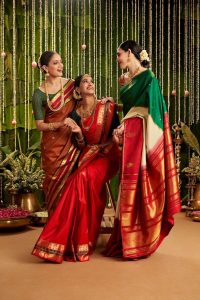
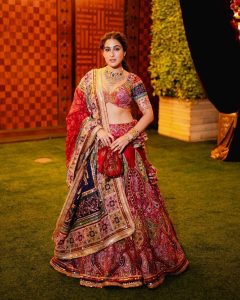
If Durga Puja is synonymous with sarees, Navaratri is the playground of lehengas and chaniya cholis, especially in Western India. Young women and girls twirl through Garba nights in multi-hued, heavily embellished chaniya cholis—flared skirts paired with cropped blouses and dupattas adorned with mirror work, embroidery, and tassels. The ensemble is completed with oxidized jewelry, juttis, and vibrant bangles, making every dancer a moving mosaic of color.
The modern lehenga choli comes in myriad styles, from traditional Rajasthani designs with gota patti and mirror work to contemporary interpretations with pastel shades, sequins, and crop tops. The key is comfort and movement—the outfit must allow for hours of dance and celebration.
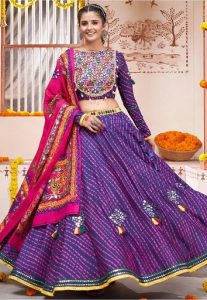
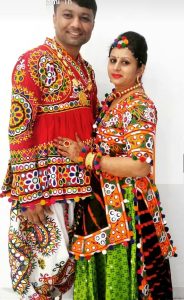
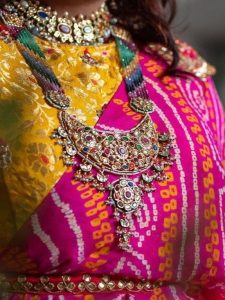
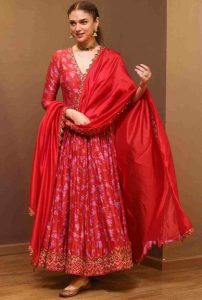
For those seeking a blend of comfort and elegance, the salwar kameez and Anarkali suits are perennial favorites . These outfits, with their flowing silhouettes and rich embroidery, are well-suited for day-long festivities, prayers, and family gatherings.They are the quintessential ethnic dresses for women.
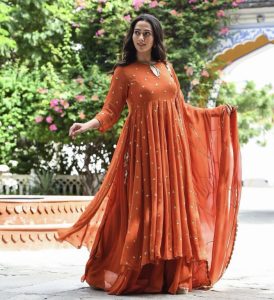
Churidars with long, ornate kurtas, palazzo suits with bold prints, and floor-length Anarkalis in festive colors all find a place in the wardrobes of women during Durga Puja and Navaratri.In Punjab, festive salwar suits and Phulkari dupattas characterize the region’s vibrancy during these festivals.
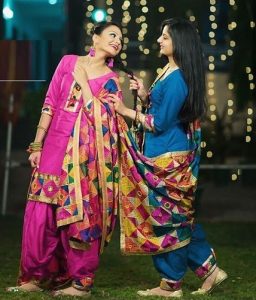
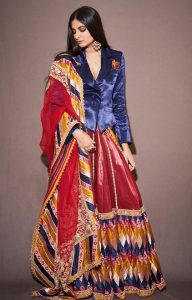
Contemporary fashion has given rise to fusion wear, which combines Indian ethnic elements with Western silhouettes. Saree gowns, dhoti pants with crop tops, and jacket-style lehengas offer a modern twist to festive dressing, appealing to the younger generation eager to experiment while staying rooted in tradition.
No ethnic ensemble is complete without the right accessories. Women adorn themselves with bangles, jhumkas (dangling earrings), maang tikka, and intricate necklaces. Flowers, such as jasmine and marigold, are often woven into braids or buns.
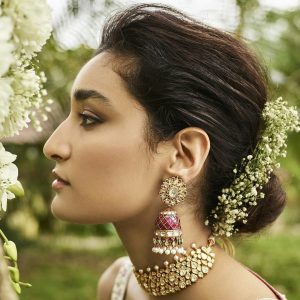
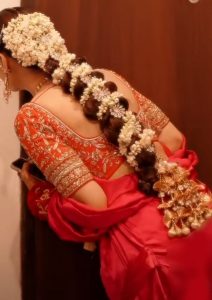
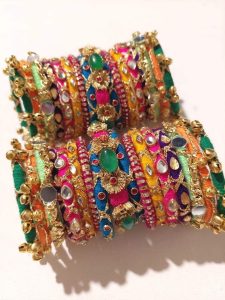
While the spotlight often falls on women’s attire, men’s ethnic fashion for Durga Puja and Navaratri is equally rich and varied.
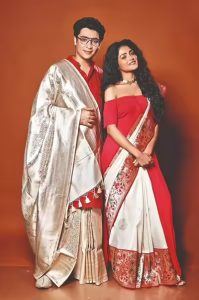
The simple elegance of the kurta pajama is the backbone of men’s festive dressing. Crisp cotton or silk kurtas in jewel tones, often paired with embroidered or printed Nehru jackets, are comfortable and stylish. In Bengal, the white dhoti with a red-bordered uttariya (scarf) is a traditional favorite for Durga Puja rituals. The look is completed with chappals or mojaris.
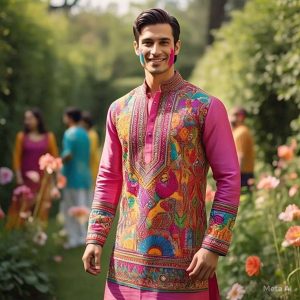
Younger men often embrace Indo-Western fashion: asymmetric kurtas, draped dhoti pants, printed or textured jackets, and even festive trousers with ethnic motifs. For example, the freedom to mix and match traditional and modern elements allows for personal expression while maintaining the festive spirit.
Further, Men choose brooches, cufflinks, and stylish footwear like mojaris or juttis to complement their outfits.
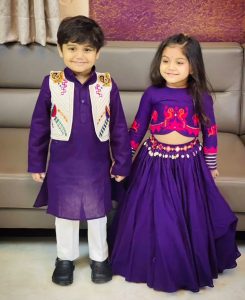
Children, too, are dressed in miniature versions of adult ethnic wear, adding an extra dose of charm to the festivities. In addition, girls don colorful lehengas and sarees, while boys sport kurtas, dhotis, or sherwanis. Outfits with lighter fabrics and minimal embellishments ensure that play and comfort go hand in hand with style.
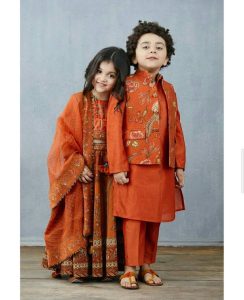
With so many options, picking the right ethnic dress can feel overwhelming. Here are some tips for making the best choice:
Ultimately, the magic of Durga Puja and Navaratri lies in their ability to bring people together—across generations and geographies—through shared rituals, music, dance, and the kaleidoscopic beauty of ethnic fashion. Whether you choose a classic saree, a playful lehenga, or a contemporary fusion outfit, what matters most is the spirit of celebration and the stories woven into every thread.
So, as the drums beat and the lamps are lit, let your outfit be an ode to the goddess, your heritage, and the exuberant joy these festivals inspire.
RELATED BLOGS
Be the First to Know. Sign up to newsletter today